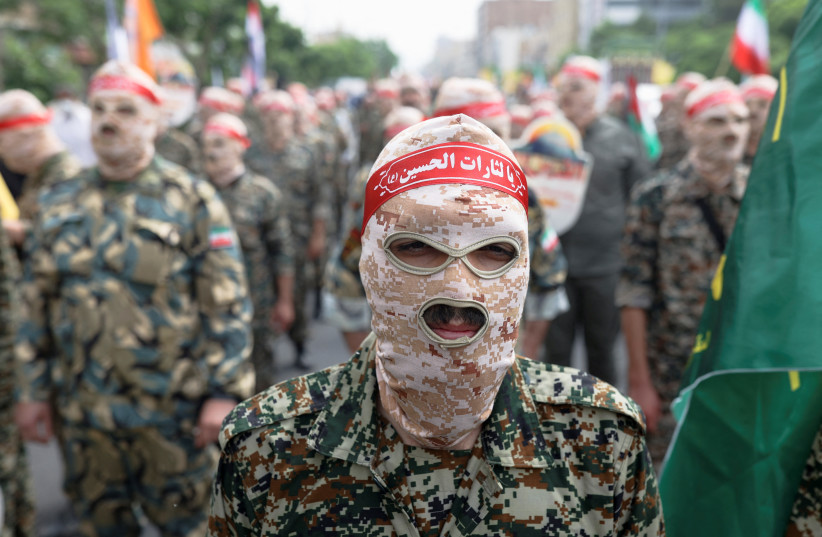When I first joined the World Jewish Congress, our Talmudic motto “Kol Yisrael arevim zeh la’zeh” (All Jews are responsible one to another) struck me as not only a motto but a mission.
It is, therefore, our responsibility to call out any and all dangers to our people and our values.
At the top of the list of threats is the Islamic Revolutionary Guard Corps (IRGC), which represents a clear and present danger not only to the Jewish people, but to the entire world. The World Jewish Congress (WJC), the representative body of Jewish communities in over 100 countries, understands the direct consequences of the actions of the IRGC, whose pernicious actions make all our affiliate communities vulnerable. Indeed, Iran has never made a secret of its hegemonic goals.
Last month, Defense Minister Benny Gantz, who met with American defense officials in Washington, said the United States sought a nuclear deal with Iran but would stand firm against any request to remove the IRGC from the State Department’s foreign terrorist organizations (FTO) list, a message that was repeated in a statement by Prime Minister Naftali Bennett the following day.
The US is one of the staunchest upholders of the universal values of justice and morality. A nuclear agreement cannot be made at the expense of these values.

Further, delisting the IRGC from the FTO list would be seen as rewarding terror and would not dissuade the IRGC from conducting terror attacks against Americans, Europeans and others around the globe.
The IRGC
The IRGC considers resistance to Israel and support for so-called resistance groups among its primary regional goals. Indeed, these have been Iranian foreign policy goals since the Islamic Revolution, in 1979. IRGC propaganda also refers to Israel as a conspiracy against the region, backed by the US and the United Kingdom.
FURTHER, THROUGH its support for Hezbollah, Hamas and other terror groups, the IRGC leads what it calls a regional axis of resistance to speed up the downfall of Israel and “the liberation of al-Quds,” (the Arabic name for Jerusalem). The IRGC provides military and strategic aid to its regional proxies, while destabilizing the global order. The Iranian regime has IRGC blood running through it at every level and this is only getting stronger.
This year, Iran will spend more than double the amount allocated to the IRGC in 2021, according to a budget bill submitted on December 12, by President Ebrahim Raisi to the Iranian parliament. According to the legislation for the fiscal year 2022, the IRGC will receive $22 billion (NIS 76 b.). Last year, the force was given a budget of $9.5 billion (NIS 33 b.).
The Iranian commitment to terrorism as a tool of statecraft is staggering.
The IRGC controls Iran’s foreign policy of malevolent destabilization by proxy. Moreover, key Iranian decision-makers are agents of the IRGC. This is a direct danger not only to Israel but also to the Gulf States, which are watching the US for leadership and reassurance that it will not bow down to terrorism for the sake of a bad deal.
Regardless of the outcome of the nuclear talks in Vienna, there can be no compromising on worldwide terror.
Delisting the IRGC would provide this terrorist organization with more ways around sanctions, thus significantly bolstering its financial resources, providing it with more freedom for evil behavior and legitimizing its destabilizing actions throughout the region and elsewhere. It would increase the IRGC’s ability to enable and support other terrorist groups, including Hamas, Hezbollah and Islamic Jihad, who would then also to take steps to be removed from the list.
Arab Gulf nations such as Saudi Arabia, the United Arab Emirates and Bahrain are watching the status of IRGC’s terrorist designation, as well. They have all been at the receiving end of Iranian-backed military attacks with missiles and drones, and view the IRGC designation as a litmus test of the Biden administration’s commitment and credibility in the region. Removing the IRGC from the list would further strain relations with such valued and trusted allies.
As WJC president Ronald S. Lauder has said, “The American-Arab-Israeli alliance should work together to prevent Iran’s nuclearization and to safeguard the West’s energy security, in light of the uncertainty caused by Russia’s invasion of Ukraine.”
“The American-Arab-Israeli alliance should work together to prevent Iran’s nuclearization and to safeguard the West’s energy security, in light of the uncertainty caused by Russia’s invasion of Ukraine.”
Ronald S. Lauder
As a world community, we are all responsible for one another. We have an obligation to do what is right and not give in to terror. Enough is enough. The IRGC must continue to be designated what it is: a Foreign Terrorist Organization.
The writer is a member of the WJC Jewish Diplomatic Corps and serves on the WJC Executive Committee. She also serves on the Executive Committee of the Ezri Centre for Iran and Gulf States Research, and the HMS Maritime Policy and Strategy Research Center at the University of Haifa.
